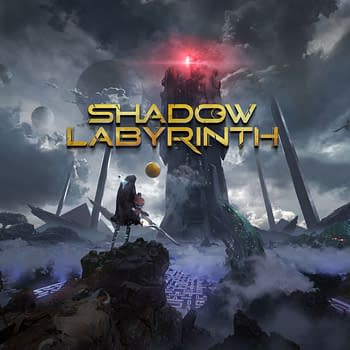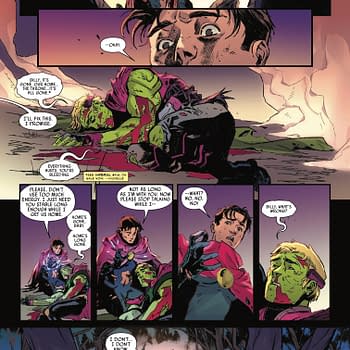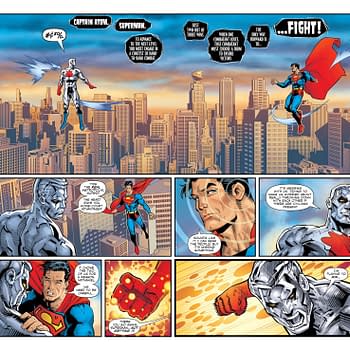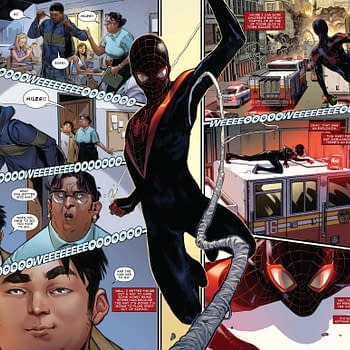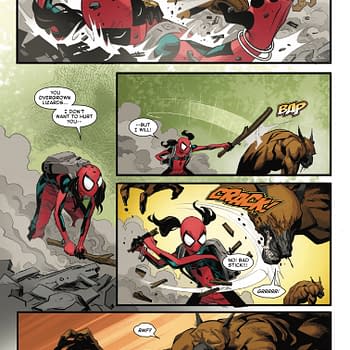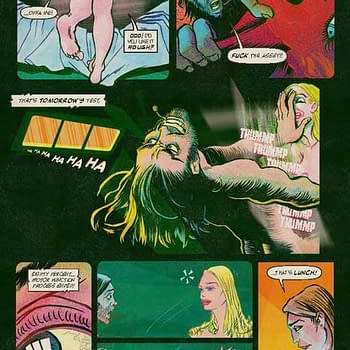Posted in: Comics, Recent Updates | Tagged: Bob Fingerman, eric stephenson, fantagraphics, image comics, Maximum Minimum Wage, Minimum Wage, robert kirkman, ron richards
"I'd Like To See Minimum Wage Become The Hellboy of Malcontent Urbanites" – The Bleeding Cool Mega Interview With Bob Fingerman

Since the series' original run, Fingerman had moved on to several gothic and apocalyptic prose novels (Bottomfeeder, Pariah), another a graphic novel (From the Ashes), and brought his dark sense of humor, complete with insistent realism, to each project. But the urge to take up the future of protagonist Rob Hoffman and find out just where life had taken him in the intervening years proved irresistible. After a surprisingly easy pitch, aided by the fandom of several Image movers and shakers, Fingerman found himself back at the drawing table and realizing that as fan tastes have changed in favor of uncomfortable realism in comedy and dramas, Minimum Wage might just be ready to reach an ideal audience when it launches from Image in January 2014.
In this mega-interview with Fingerman, only days after the ongoing monthly series from Image was announced, he discusses what's changed, what's stayed the same, and what we can expect from the upcoming "first season" as it heads to print, and also to digital, publication.
THE FUTURE AND PAST OF MINIMUM WAGE
Hannah Means-Shannon: Well, your big news is out. You always thought you might be returning to Minimum Wage, right? You never fully thought that was it, with the series?
Bob Fingerman: Well, I'd always hoped that I would. It felt unfinished. I put an ending on it, but it was a very, very opening ending, because the intention was eventually to come back and finish the story. It didn't look like that was ever realistically going to be an option. Until working with Image, and then I began to see it as doable. It will be, by the time the first issue comes out, it won't quite be 15 years since the last one, but I think the last actual serialized issue came out in 1999. It's a really long gap between parts of a story! It feels a little sooner with the books, but in terms of actual forward momentum, it's been quite a while. I think it'll be easier to reach and keep an audience this time around because it's going to be on a regular schedule. When I was doing it with Fantagraphics all those years ago, it sort of came out when it came out and it wasn't on a clock, whereas Image has very smart strategies for this kind of thing. I think that the fact that it'll be coming out on a monthly schedule will make it a lot easier for readers to know when to buy it, as opposed to, "Oh, look, there's a new issue!" It won't be so random.
HMS: Image is good about getting it into the retailer shops and having enough copies of things.
BF: Absolutely. This is all about trying, in a way, to learn from past inexperience and do it right this time.
HMS: When Minimum Wage came to a halt before, was it for creative or financial reasons, or both?
BF: There were some sticking points that I wasn't sure how I wanted to resolve creatively. That would have resolved itself quicker. Some of it had to do with being kind of disillusioned with the business, which has happened to me more than once. It happens to a lot of people in the business. You have these moments. I also, at that point, was becoming more interested in writing prose so I did want to put it aside, and that was when I started writing novels. I wrote my first novel in 2000 and that would be right after I stopped doing Minimum Wage on a regular basis. I just wanted to branch out and try some different things. It had developed a loyal following, but not a large following so out of necessity I needed to begin considering some other options. But I'm very optimistic about its chances now because it's just such a different situation and different publisher. This is definitely not any kind of slam on Fantagraphics. I was very happy working with them and continue to work with them on other things. But I think Image is probably a better fit for this.
HMS: Well especially the way that Image's identity has shifted in the past few years to be so multi-genre.
BF: Yeah, definitely. If even a few years ago, or once upon a time, someone had suggested that Image would be the future home of Minimum Wage, I would have laughed. I would have said, "I don't see how that fits in with their aesthetic". But now they don't have an aesthetic. Now they just seem to be very open to all kinds of genres and artistic approaches and so forth. It's a new Image. And they are really good people there. I've really enjoyed working with them.
HMS: Is this still a creator-owned project? Do you still retain rights with Image?
BF: That's again, one of the best contracts I've ever gotten, because I retain 100% rights. Hard to beat that. This is a one-man operation and it always has been, so total control of the property. It's pretty great.
HMS: Can you tell me a little bit about your original goals for the series and how they might be similar or different now?
BF: Well, one of the original goals which definitely hasn't changed, is that I would really like to see it developed as a TV property, and I'm kind of hoping with it continuing that that might show potential producers out there that there's more storyline. Something wrapping after 10 issues might give the wrong idea, but that was always a goal as much as doing the comic is great. This is going to sound very crass, but I'd like to expand the Minimum Wage "brand". I'd like to see it become the Hellboy of malcontent urbanites.
HMS: Even the youngest creators who are doing self-published books–brand is the word that they are using–so there's nothing particularly crass about it these days.
BF: Well, that's because we are living in a world that is so crass that it's not crass anymore!
HMS: There are some, but there are very few people who would say that they wouldn't like to see a film or TV property. But I think especially because you're a writer and an artist, you've got these concepts and ideas and you can see how they would translate into different mediums because you have worked in various mediums.
BF: I think particularly in the case of something like this because it was always written in a very episodic fashion. It's an ensemble piece, though obviously you have your main character. Not for nothing, but I grew up watching television and I'm sure that television structure has always been a part of how I put this together as a comic, so it would be lovely to see it fulfill in a way its genetic destiny to see actors playing these parts on TV. But then again there also things you can do in a comic that you can't do on TV, so that's the joy of doing it as a comic.
About its goals, though, since I've skipped the story forward a few years, in the comic, not as many years as it's been in real life, but in comic years, three years have passed, there's a somewhat different tone to the comic now. I think it still feels very much like Minimum Wage but Rob's life is different now and he's in a different place as a person. I'm hoping to explore some different emotional territory for him in this. Maybe he's a little bit more mature, but he's also a little bit more bitter. Maybe more guarded than he was. So that gives me some new creative challenges because I didn't want to just pick up exactly where I'd left off.
Because to me, that just seemed kind of boring. In a way, this isn't so much a spoiler since it's in the solicitation copy, but he's just recently divorcing in this now, so that obviously a huge difference. Because Sylvia was such a big component. And now she's absent, she's gone. So that changes the dynamic of the comic a lot. To me, it was creatively more interesting to just skip their marriage.
And that was one of the things, when you asked were there creative reasons why I did decide to end it in '99, one of the creative things was, do I really want to portray the whole crash and burn of their relationship? And I really wasn't sure if I did. And it wasn't just because that would be a miserable thing to depict. But also I was just kind of thinking, I don't know how much fun that is for readers, I don't know how much fun that is for me. But to me, once the idea came to me of just skipping it. Thinking, "Let's just skip forward a few years. The whole thing, literally. Let's just skip it". Then 18 issues just outlined themselves almost immediately. Because it just gave me a whole new set of things to play with. A new set of situations and problems. It was a very liberating thing to decide to move forward.
HMS: That was the kind of Eureka when you set yourself free from that problem, in a way?
BF: Well that was one of the Eureka moments, because the other one was, since this thing has never been pure autobiography by any means, it's certainly been informed by my life. The other one was that a certain point you don't want to share. I was looking back at a certain point in my life and I didn't want to depict anything I'm currently living because that's my private life. That's personal. I didn't want to do anything with my relationship with my wife because that's personal to her. And she's a professional woman and she doesn't necessarily want her private life trotted out where people can read about it. And also the other thing, just intrinsically, is that it's not very interesting to write about a happy marriage. And Michele and I have been together for 22 years at this point.
Obviously, this one works. So that right there is almost by nature not good fodder for a story. Who cares? Oh, look, they're happy. Done. One issue. One of the things that I was going towards, when I was working with this, was a happy ending. It was going to be that Rob meets "his Michele" and the other epiphany was, "Not necessarily". This isn't autobiography. I have the liberty to fictionalize so that gives me a whole lot more to play with. So long as it always feels real. We were talking before about the age where brand doesn't seem crass. We're also living in the age of Stephen Colbert's truthiness and so long as there is always that layer of truthiness to what I'm doing, it doesn't have to be true because it never really was. Truthiness was always sort of what I trafficked in, now it's just a little bit more integral to the forward momentum. Which isn't to say that a lot of my real life won't be in there. I'm just hoping that a lot of it will be indistinguishable to people who don't know my life.
MARRIAGE IN COMICS–MISTAKE OR BIG MISTAKE?
HMS: Portraying happiness is something that other people have struggled with too, of course. It doesn't make for the greatest story. Well, you know there's been that big debacle with DC Comics about how they won't let their characters get married.
BF: Oh, yes, I read about that! About how Batwoman she can't gay marry her girlfriend because they can't be happy. That just made me laugh.
HMS: Yeah, I tend to take the side of JH Williams, who was the co-writer and artist on the book. Basically, he came out with a blog post about leaving Batwoman because of editorial decisions throwing away the marriage plot and other things too. As the media outlets started picking it up, Dan Didio came out several times saying basically that it's not being anti-gay marriage, but anti-marriage. We don't want our heroes to be happy. And of course everyone said, "Have they been married? Marriage is not always happy".
BF: Yeah, exactly! In spite of everything I just said. That is a weird editorial choice. When I read about it, I did not think, "Oh, yeah, they're anti-gay marriage". That didn't even occur to me. I just thought it was a weird thing. Also, just being married could lead to all kinds of things. It's a world of superheroes. There's a certain kind of strife that could be involved with that kind of relationship. In addition to that, if you have a wife, and people suddenly know about it… Wasn't the whole thing with Spider-Man that he could never have a girlfriend because people would know about it and her life's in danger, too? I mean, geez, the wife or husband of a superhero would always be in peril.
HMS: It would take a lot of work to do that well, but I think it's possible to actually ramp up the tension and the problems if you were dealing with married characters. It would just take a lot of intricate thought about how to do it properly.
CHANGE OR DIE
HMS: So, what is it like to physically draw these characters again? Have you changed your techniques at all, or you layouts or anything? Are you going back?
BF: Yeah. It definitely looks different than it did. My drawing style and technique–I'd like to think I'm better than I was a number of years ago. But yeah, I didn't want it to look like just jumping right back in. There's a kind of very deliberate look to the book. This is shop talk but rather than 3 tiers per page as it was during its run, it's now 4 tiers per page just because when I was working on From the Ashes, that's how I worked. And I kind of liked the more cinematic wide-screen letter-box approach to doing panels. Visually, it had a nice flow so I think it does look quite a bit different than it did. And the characters look a bit different. Not unrecognizably so, but a few years have changed in their lives, so hairstyles and some people have gained weight. There's a Gasoline Alley approach; people change with time. I couldn't think, as much as there's something to be said for consistency, it's also kind of boring to do things exactly as they were. And I don't even think I could. An evolution of the style.
HMS: Having spoken to you in the past, I doubted you would literally repeat your style, like you're imitating yourself at an earlier phase. Why would someone want to do that?
BF: Yeah, I don't even think I could do that. It just seems very backwards to me. There are some people who you look at their work from 30 years ago and now and it just seems exactly the same. I don't even know how that's possible. I don't know if it's a conscious decision or at a certain point they reached a plateau and they just stayed there. Plus, for me, it's just not the way I'm wired. There's just change.
HMS: Your career has progressed in jumping between different mediums and you seem to always be experimenting and taking on new things. But as far as I knew, Image could've said to you, "If you want to do this deal, it has to look exactly like that". I'm glad they didn't.
BF: I'm saying this not to sound immodest, because you want to make sure that the people you're working with are happy, but I was delighted to hear that Robert Kirkman thought it [the new series] was the best work I've ever done. The new stuff. So that's a relief because a huge part of the reason that I'm with Image has been Kirkman liking my work. So it would devastating if I turned in the first new issue and he kind of went, "Meh". So it was good for my ego but it was also a big sigh of relief that he really liked it.
WHAT EXACTLY HAPPENED TO MAKE THIS HAPPEN?
HMS: What's the basic process that happened to get this book going again? How did this happen with Image?
BF: With Image, it was as easy as me sending Robert [Kirkman] and e-mail because I contacted him directly. And I just said, "Hey, I kind of want to do this big collected edition of Minimum Wage", and I just laid out what I wanted in it, and about 3 or 4 hours later, I get an e-mail from him saying, "I want this book to exist. I'm going to make it happen". It was that easy. But even with that, I wasn't thinking of starting the series up again. It was only over the course of putting that book together and the book actually being in my hands. Because at that point several months had gone by with me working on those characters and again and me saying, "I really would like to finish this".
HMS: What was your next step talking to Image about it?
BF: Well the next step was at the Book Expo America, when I was talking with Ron Richards. Ron is Director of Business Development and he and I were kind of working the floor together. I was signing cards, around the time the book [Maximum Minimum Wage] came out, and I was saying to him how I'd love to start doing it again but I wasn't sure if that was even a realistic thing to think. Not just creatively but practically, financially and so forth. And he said, "Well, talk to Eric Stephenson. Because Eric really likes the book", and I knew I had Kirkman in my corner. It was strangely easy. I told Eric I'd like to start doing the book again, and at that time I had a 12 issue arc in mind. And he said, "Yes. Talk to me after BEA". And I spoke to him the next week and we hammered out a deal. It was as easy as that. I'm one of these people who's always waiting for the other shoe to drop, but the one thing I've been thinking is, "It's all been so easy". So far it's all been really good and they've been incredibly supportive.
That was April or May of 2013. It has all moved pretty quickly in terms of getting this thing back on track. 15 years of nothing and suddenly things moving along. And that was also one of the reasons that I wanted to approach Image with the big book. They move really fast. Traditional mainstream book publishers move really slow. And I wanted to jump right in with something and get it going. And I've got to say, boy, Image is the place. I know I sound like a company man, but I'm enthusiastic to be working with them.
HMS: If you had gone with one of the more graphic-novel publishing book companies, yeah, it would have been a couple of years. It would have been slow.
BF: And things change in a couple of years when you're waiting for something to come out. And one of the things that definitely can happen is that your own enthusiasm for your own thing can diminish. And that's definitely not something I wanted to happen in this case. Because also in the intervening time you might start pursuing other things and your moment comes, and then you can no longer do it. You might move on.
HMS: Is it a shock to the system to be going from prose, which you were doing before, back into comics full time?
BF: Yeah, it kind of is in a way. Because it's a very different medium. Not just different creatively. It actually is different physically. There's comics–I love doing them–but they are definitely more physically demanding. They are longer days. In a way with prose, I was using my brain in a more concentrated manner because when you're writing it's all about getting the words right whereas with comics it's down to the drawing. It becomes a little bit, not quite autonomic, but it's not using the same part of the brain as writing. But the days are a lot longer. There's a lot more being hunched over. When you're drawing a comic, you definitely have to get up and stretch your legs a lot or you will end up with scoliosis or something, debilitated. It's still easier than coal mining! I don't want to give any impression I'm bitching and moaning about it. For all the long hours, it's still a pretty cushy job.
HMS: You once said that you tend to work in full scripts. Is that still the case for this?
BF: Oh, yes, absolutely. I can't see working any other way. I don't like writing myself into a corner. And actually, one the main changes in the creative process working on this one, and I think that's partly because I've been doing so much writing for the past 10 plus years, I think my writing habits have gotten better, and a bit more disciplined. But I never used to work with an outline. I used to think, "Oh yeah, do it as I go". But with this thing now being a monthly book, and the way it's going to be scheduled are in 6 issue arcs that are going to be coming out on a monthly basis. In a way, it's very much like television. That's the way that Eric [Stephenson] pitched it to me.
The working method is sort of like it runs for–let's call 6 issues a "season"–and then I go away and then I'm working on the next batch. It goes away, a trade paperback comes out and the next season starts shortly thereafter. So I wanted to have it really mapped out. It's not like I've written the full script for the next 2 or 3 years' worth, but I know where I'm going and right there, that is a big departure from the way it used to be. But I didn't want to write myself into any weird corners where it's like, "Uh, what do I do now?". That's actually good because I really have this creative road map
HMS: There's a little bit of pressure there knowing that this needs to come out every month, too.
BF: Yeah, it gives me a big jump on it. I'll have 4 issues in the can before the first one comes out, so that gives me a very nice cushion.
HMS: And it's true that there are a few Image books that are very popular but there are big delays between issues and that impacts fans.
BF: Yes, it's also a way to lose your readers. One of the lessons learned from when it came out sporadically in the past is that it's very easy to have a lot of drop-off if people don't know when their next fix is coming, so with this they will be guaranteed that for 6 months in a row they will have an issue every month, and then there will be a gap. So long as you can adhere to the schedule you've given yourself, everything should be fine.
THE DIGITAL FUTURE OF MINIMUM WAGE
HMS: So the Image issues are coming, potentially being collected into trades, and you've got the potential here for several years of works, perhaps. Is this going digital?
BF: Yes. I think ComiXology will also have the issues as they come out. It will be the first multi-platform thing I've ever had come out on a regular basis. That's definitely different.
HMS: The older issues, they aren't digital are they? Have they been scanned?
BF: No, but actually, I'm glad you mention this. Image are actually going to be releasing all of the original, what would have been "issues" but are now "chapters", also digitally. For people who think that Maximum Minimum Wage is too big a bite and don't want to take a chance, they will be able to get the original ones individually. I believe the first chapter will be free, so that'll give people a chance to read it without having to commit financially to it.
HMS: Actually, that's huge! That's a really big deal. Do you know if that's going to come out before the new series?
BF: I think before. I'm not sure exactly when but I think those will be coming out this year. And I don't know if they are going to release all 10 at once in Netflix style, or a couple every week. I don't know if that's been decided yet.
HMS: So those are the issues that you remastered so much for the collection so you don't have to tweak them in any way now. So they are ready?
BF: Right. They are ready to go. And I think they are probably going to pair them up with the original covers.
HMS: Now, you don't compose digitally, do you? You're a hand-drawn artist, right?
BF: Yes. Actually, as we've been talking I've been sitting working on the computer. I do some of the finishing on the computer. All the drawing is still done the old fashioned way. Adding tones and stuff I do digitally and the lettering I do digitally.
HMS: So has knowing that all these issues are going to be available digitally affected how you are composing them?
BF: Not really. I am just working the same, in terms of the visual approach.
HMS: ComiXology for instance has different ways of viewing comics. Guided view and different approaches and the creator can choose some of those things. But given that this is carrying on from a comic that was established before those things, I imagine you're taking a fairly straightforward approach to the reader experience. You would literally read the page, right, rather than a particular panel at a time?
BF: Yes. I would imagine so. In fact, I've pretty much made it impossible for the comic to be reformatted with the way I'm doing the lettering on the new pages because the way the balloon placement is very different from the way it was originally done. The balloons overlap the panels above, so they are resting a bit on the previous panel and over the borders so that would make it impossible to cut up the page. It was just a solution for how I wanted to do it, but if it prevents cutting up the art, so much the better!
TEASERS ON THE FIRST ARC OF MINUMUM WAGE
HMS: Would you like to give a little bit of a teaser about what sort of tone, what sort of life and events we're going to see in these first 6 issues? How would you describe it for readers?
BF: Well, Rob's career is transitioning a little bit. He, in the original series worked pretty much exclusively for that kind of Mad Magazine/Cracked Magazine type thing, he worked for Daft, and a bunch of porn places, mainly the one Pork, the sleazy tabloid. So his career is kind of transitioning at this point, and actually one of the ongoing things is going to be him beginning to work more in the field of comics. But on a mainstream franchise books, which I did way back when, but his commitment to it will be longer than mine because it's better for the story! And also, obviously, his being single and being back in the world of dating, which is something that the readers have never seen. So I think those are both pretty substantial changes. We also get to see a bit more of his relationship with his mother in there. She appeared literally in 2 panels in the entire book previously, but as he is recouping his finances, he's living with mom again. And of course, once you've left the nest and come back, it feels like rather a big failure. He's dealing with a lot of things. He's got a lot on his emotional plate.
HMS: Well that's something that people are definitely going to relate to! Because that's been a whole pattern during the economic crisis. Of people having to return home again. That's a thing.
BF: That's true. Even though this takes place in the year 2000, that's definitely a very contemporary feel of not being able to afford to live on your own. Which, as a single guy, that makes him feel doubly weird.
HMS: That prompts me to ask, how difficult is that, to remind yourself constantly that you have to erase 12, 13 years from your existence-memory, so that you don't put stuff in the comic that's anachronistic?
BF: Well, it's definitely something I have to be mindful of the entire time. Like, for instance, and this is something I put in the solicitation copy, and now it seems not noteworthy, but now Rob has a cellphone. But the thing is, it's the year 2000, and I had to make sure he has the correct cellphone for 2000. I do not want anachronism. Actually, Michele caught an anachronism in the first issue. In a club scene, I had a guy wearing an Ed Hardy t-shirt, because to me an Ed Hardy t-shirt is so synonymous with a certain kind of douche-bag.
[laughter]
And actually, I did a little research, and Ed Hardy wasn't a brand until 2002, so I had to get rid of that t-shirt. So, yeah, there are definitely things where I have to police myself. Rob's wearing more heavy-metal t-shirts and it's always fun to give shout-outs to bands you like. But I can't give him a Sword t-shirt as much as I'd like to give him Becky Cloonan's Sword t-shirt, he can't wear it because that's a 2013 t-shirt.
HMS: When you set a book a long time ago, you can build up a world during that time-period, but when you're basing it on your memory of a decade, that's blurrier, isn't it?
BF: There's definitely things. Everyone's computer monitor and all of that are big and chunky. Nobody's got a flat screen. There's a lot to stay on top of. You wouldn't think it, but there is. It keeps me on my toes. And it will probably keep some readers on their toes. I'm sure if I commit any anachronistic crimes, someone will let me know.
TV HAS CHANGED THE ZEITGEIST FOR COMICS
HMS: So, you've written 4 issues, you're drawing the 3rd issue now, you had this enthusiasm, things went surprisingly well. How are you feeling right now?
BF: I'm feeling good. I'm feeling strangely optimistic. My goal now is the same as it was then, to just reach a bigger audience and I think this time around it has the opportunity it might not have had in the late '90's. For one thing, people, because of TV shows like Girls and Louie and Curb Your Enthusiasm–and I'm not saying these people ever saw my work because that would be vainglorious of me–but because of these more grounded, voyeuristic type shows, I think there's more of a receptivity to this kind of material that didn't exist when I was doing it originally. I remember Peter Bagge telling me once when I was pondering why Minimum Wage wasn't selling better. He said, "You don't give people any break. It's like there's no comfort in your work. And, you know, maybe back in 1996, 1997, that was a big "no no", but I don't think it is now. We're living in a more voyeuristic world, so I'm thinking maybe now's the time. Maybe between that and Image having a deeper reach to audiences, fingers crossed, maybe it will finally reach the audience I had always hoped it would reach. And if it does, that will certainly make continuing doing it more feasible.
HMS: The way that TV has changed, with HBO and Showtime and higher production values, TV has changed the zeitgeist.
BF: Things don't have to be glamorous anymore on television. A show like Friends, it was a well-crafted show, but it was on another planet. But a show like Girls, whether you like it or don't want it, that's definitely set in a very real world. I was impressed that this is a show that's not trying to craft likable characters–though I try to craft likable characters, I'm old-fashioned that way–I really respected the fact that it was really down in the mud. And again, Louie. Louie has had some really brilliantly observed stuff. Even though he goes off on these surreal, Fellini-esque tangents from time to time, it is a show that is definitely grounded in an emotional reality, and you would not have had a show like that 10 years ago. No way. I think the only show that I can think of that on an emotional level, and that one was around 20 years ago, was the Larry Sanders show. That show was so far ahead of its time in terms of taking the glamorous world of television and completely showing it warts and all. That to me is probably one of the greatest shows of all time. But it definitely began to change the way that people saw what people could do on TV.
HMS: Well, on a personal note, I would say that you were ahead of your time with Minimum Wage, and thankfully you've survived long enough to see the time come around with this comic. There are fans who are just waiting for this.
BF: Well I never like to count my chickens, but when I was free to share the announcement on Facebook, and also from the USA Today article, one advantage of digital over print, is you can see what the response has been. The fact that so many people shared it on Facebook directly from USA Today and on my fan page, people I don't know are sharing it and showing interest.
HMS: Many thanks to Bob Fingerman on behalf of Bleeding Cool for this extensive interview and his frankness about his experiences bringing Minimum Wage into a new iteration.
Hannah Means-Shannon is Senior New York Correspondent at Bleeding Cool, writes and blogs about comics for TRIP CITY and Sequart.org, and is currently working on books about Neil Gaiman and Alan Moore for Sequart. She is @hannahmenzies on Twitter and hannahmenziesblog on WordPress. Find her bio here.














